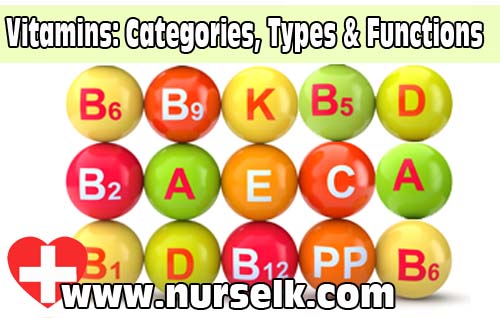Vitamins are divided into two categories
- Water-soluble vitamins : Water-soluble vitamins travel freely through the body, and the part that the body doesn't use passes through the kidneys and leaves the body as urine or stool. The body needs water-soluble vitamins in frequent, small doses. And they are unlikely to reach toxic levels. All the B vitamins and vitamin C are water soluble.
- Fat-soluble vitamins : Vitamins A, D, E, and K are fat soluble. These are stored in the body's cells and are passed out of the body as easily as water-soluble vitamins. Fat-soluble vitamins can reach toxic levels if a person gets more than needed.
Water-Soluble vitamins
- Vitamin B1 (Thiamine ) : is needed for energy metabolism. It is important to nerve function.
- Vitamin B2 (Riboflavin) : is needed for energy metabolism. It is important for normal vision and skin health.
- Vitamin B3 (Niacin) : is needed for energy metabolism. It is important for nervous system, digestive system, and skin health.
- Pantothenic acid : is needed for energy metabolism.
- Biotin : is needed for energy metabolism.
- Vitamin B6 (Pyridoxine) : is needed for protein metabolism. It helps make red blood cells.
- Folic acid : is needed for making DNA and new cells, especially red blood cells.
- Vitamin B12 (Cobalamin) : is needed for making new cells and important to nerve functions.
- Vitamin C (Ascorbic acid) : is needed for protein metabolism and important for immune system health. It aids in iron absorption.
Fat-Soluble vitamins
- Vitamin A : is need for vision, healthy skin and mucous membranes, bone and tooth growth, immune system health.
- Vitamin D : is needed for proper absorption of calcium stored in bones.
- Vitamin E : is a antioxidant and it protects cell walls.
- Vitamin K : is needed for proper blood clotting.


